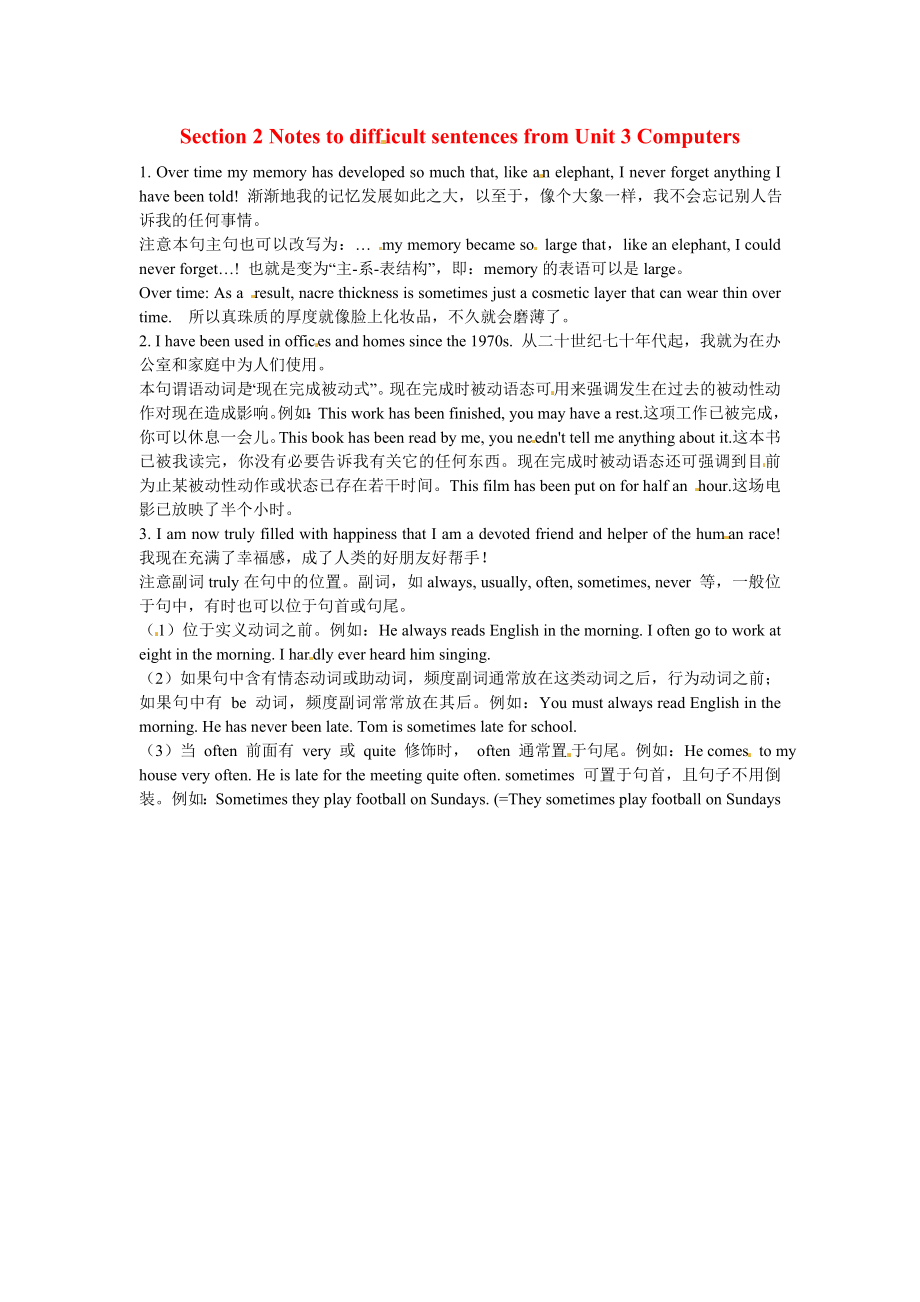《浙江省2013年高中英語 Unit3 Computers疑難解析 新人教版必修2》由會(huì)員分享,可在線閱讀�,更多相關(guān)《浙江省2013年高中英語 Unit3 Computers疑難解析 新人教版必修2(1頁珍藏版)》請(qǐng)?jiān)谘b配圖網(wǎng)上搜索�。
1���、Section 2 Notes to difficult sentences from Unit 3 Computers
1. Over time my memory has developed so much that, like an elephant, I never forget anything I have been told! 漸漸地我的記憶發(fā)展如此之大�����,以至于,像個(gè)大象一樣����,我不會(huì)忘記別人告訴我的任何事情。
注意本句主句也可以改寫為:… my memory became so large that���,like an elephant, I could never forget
2����、…! 也就是變?yōu)椤爸?系-表結(jié)構(gòu)”�,即:memory的表語可以是large。
Over time: As a result, nacre thickness is sometimes just a cosmetic layer that can wear thin over time. 所以真珠質(zhì)的厚度就像臉上化妝品���,不久就會(huì)磨薄了�����。
2. I have been used in offices and homes since the 1970s. 從二十世紀(jì)七十年代起�����,我就為在辦公室和家庭中為人們使用��。
本句謂語動(dòng)詞是“現(xiàn)在完成被動(dòng)式”?�,F(xiàn)在完成時(shí)被動(dòng)語態(tài)可用來強(qiáng)調(diào)發(fā)生在過去的被動(dòng)性
3���、動(dòng)作對(duì)現(xiàn)在造成影響。例如:This work has been finished, you may have a rest.這項(xiàng)工作已被完成���,你可以休息一會(huì)兒�����。This book has been read by me, you needn't tell me anything about it.這本書已被我讀完�,你沒有必要告訴我有關(guān)它的任何東西?��,F(xiàn)在完成時(shí)被動(dòng)語態(tài)還可強(qiáng)調(diào)到目前為止某被動(dòng)性動(dòng)作或狀態(tài)已存在若干時(shí)間�。This film has been put on for half an hour.這場電影已放映了半個(gè)小時(shí)���。
3. I am now truly filled with ha
4、ppiness that I am a devoted friend and helper of the human race! 我現(xiàn)在充滿了幸福感���,成了人類的好朋友好幫手����!
注意副詞truly在句中的位置�����。副詞�,如always, usually, often, sometimes, never 等�,一般位于句中,有時(shí)也可以位于句首或句尾����。
(1)位于實(shí)義動(dòng)詞之前。例如:He always reads English in the morning. I often go to work at eight in the morning. I hardly ever heard him sin
5���、ging.
(2)如果句中含有情態(tài)動(dòng)詞或助動(dòng)詞���,頻度副詞通常放在這類動(dòng)詞之后����,行為動(dòng)詞之前;如果句中有 be 動(dòng)詞�,頻度副詞常常放在其后。例如:You must always read English in the morning. He has never been late. Tom is sometimes late for school.
(3)當(dāng) often 前面有 very 或 quite 修飾時(shí)���, often 通常置于句尾。例如:He comes to my house very often. He is late for the meeting quite often. sometimes 可置于句首�,且句子不用倒裝。例如:Sometimes they play football on Sundays. (=They sometimes play football on Sundays
 浙江省2013年高中英語 Unit3 Computers疑難解析 新人教版必修2
浙江省2013年高中英語 Unit3 Computers疑難解析 新人教版必修2
